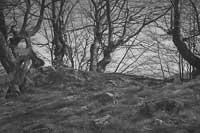Ecological status of Gipuzkoa
On June 5, under the slogan Gure Lurra, our habitat, our house, was celebrated World Environment Day. That day many politicians published their views on the environment in the media. And among them it seems to me that the statements made by the Provincial of Gipuzkoa, Iñaki Txueka, have a special interest.
Doing a surprising ecological study of Gipuzkoa, Txueka described the situation of our territory as quite well. The evaluation by areas was even more surprising, giving outstanding to the forests of Gipuzkoa, very well to the beaches and natural spaces, quite trash and pollution and, finally, quite fair to the state of the rivers.
In my opinion, this environmental assessment of Gipuzkoa is at least too optimistic, not being totally disproportionate. And it is that, analyzing the ecological situation with objective eyes, and not with the eyes of a politician who has to somehow justify his work, today we will hardly get enough. But let's take a similar journey: let's analyze the issue by area.
I find it rather courageous to say that the situation of the forests of Gipuzkoa is excellent. People who visit the mountain know how difficult it is to find native forests. It is true, on the other hand, that great work is being done in this field; fortunately, in the revegetation projects that have been carried out in recent years, the economic criterion has not been imposed and a great effort is being made to reintroduce the hardwood trees. However, much work remains to be done and to see the fruits of the new situation it will still take many years. While the situation in our forests is undeniable right now, we are still far from achieving it.

As for the beaches, it is understandable the rating given by Txueka. When measuring the quality of the beaches, the services they offer, the cleanliness and the quality of the water are the only factors that are taken into account. That is, aesthetic vision is given importance, forgetting that the meaning of the word ecology is much broader. And from an ecological point of view, the situation of our beaches is not excellent. Excessive use and urbanization has brought to its minimum the dunes of the beaches, along with its unique vegetation.
As a result, to be able to reside in this environment, some species of plants very unique for their unique biological adaptation have disappeared and others are in danger of extinction. Obviously, this will mean an irrecoverable loss of our natural heritage.
And on the natural environment, in my opinion, Mr. Txueka worked too optimistic. It almost makes me change my mind by answering the following questions: What has been done in the natural parks of Gipuzkoa, besides the mere statement? Will the policy of natural parks being carried out not become a mere green area of attraction for large masses? What is the protection of Txingudi Bay? How can one understand the construction of a marina to destroy the marsh of Santixo de Zumaia, the second wetland of Gipuzkoa? I think there are many questions or doubts that exist to be able to obtain the qualification of very well possible.
However, it seems to me something more objective what was said and the rating given in relation to garbage and pollution, but I have doubts about it, since the situation of garbage seems quite chaotic to me. Without a clear recycling policy, small initiatives such as paper or glass have been launched. But these initiatives have not come hand in hand with serious awareness campaigns and, moreover, the origin of the problem, the production of waste, has not been looked at. Meanwhile, incineration is spoken of as a definitive solution to this problem, leaving aside the health problems posed by incineration.
And finally, I would say that the rating given when analyzing the state of the rivers is the most related to reality. In this matter a positive assessment could not be made, since we are all aware of the painful situation of the rivers. Moreover, I don't think our rivers can overcome this study. As with beaches, the ecological state of rivers has not been treated in the same way and only the quality of water has been taken into account, and there is no doubt that for years the quality of water has improved a lot, but the economic crisis has influenced more directly than the work of public institutions, since many of the factories that poured pollutants into rivers have been closed. In any case, for the ecological study, rivers should be considered as ecosystems, so it is necessary to analyze the set of water currents and river margins.
Ecological quality cannot be measured solely according to the physical or chemical parameters of water, but according to its capacity to harass life, of course, it is intimately related to water quality and the state of the shores. Therefore, let us not deceive the inhabitants of Gipuzkoa: by channeling rivers and streams, it will not improve their ecological state and, at most, we will obtain cleaner streams of water, not rivers with life.
With all this, I do not mean that the environment of Gipuzkoa has no future, much progress has been made in recent years, but the road ahead is very long. To be able to say that the ecological situation of Gipuzkoa is very good, the work should be done with enthusiasm. One of the most important and complicated parts of this work will be to mentalize the political authorities of Gipuzkoa: we must warn that the development built with concrete can never coincide with respect for the environment.





